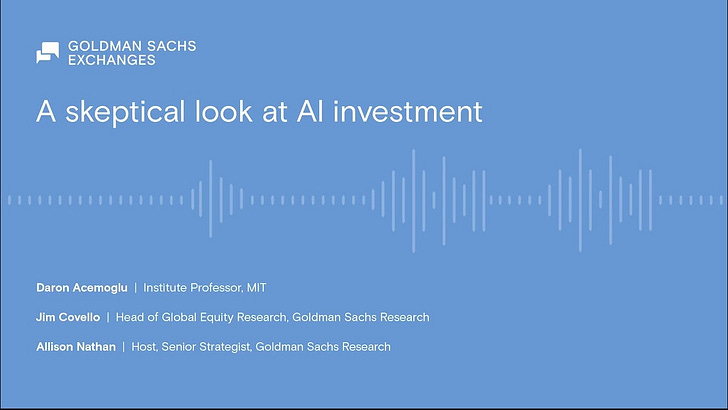Generative AI: Why is Goldman Sachs not so impressed now?
A skeptical look at AI investment and this big, new 'pie in the sky'!
Generative AI is touted as one of the most transformative innovations in history. In the coming years, companies are expected to spend over $1 trillion on AI-related technology.
While the potential benefits are substantial, questions remain about whether AI can deliver on these promises.
Big ideas from Goldman Sach’s recent take on Generative AI's transformative potential (or not).
Generative AI is seen as a major driver of market optimism, with predictions that it could automate up to 25% of work tasks, boosting productivity by 9% and GDP growth by 6.1% over the next decade. However, significant challenges remain in realizing these gains, particularly in the cost-effectiveness of AI applications.
Skepticism about AI's short-term impact
Despite the hype, experts like Daron Acemoglu argue that AI's short-term impact on productivity will be limited.
Only a small fraction of tasks will be cost-effectively automated in the next ten years, resulting in a modest productivity boost of about 0.5% and GDP growth of 1%.
"Generative AI is being heralded as one of the most transformative innovations in human history, but we're a couple of years in, and there's not a single thing that this is being used for that's cost-effective at this point."
The importance of economic theory in AI predictions
Economic theory helps to temper overly optimistic predictions about AI's impact. It suggests that while AI can transform certain tasks, many human activities are too complex for immediate automation. Thus, the transformative effects of AI are likely to be more gradual than some expect.
Challenges in achieving cost-effective AI automation
Achieving cost-effective AI automation is complex.
Factors like the quality and availability of data, the scalability of AI models, and the limitations of current AI architectures pose significant hurdles.
For instance, doubling data or compute capacity doesn't necessarily translate to doubling AI capabilities.
"If you're thinking about the next few years, we know the models. So anything that's invented or big breakthroughs, it's not going to have a huge effect within the next few years."
The role of human cognition in AI development
Current AI models are impressive but still fall short of replicating human cognition, which involves diverse sensory inputs and cognitive processes.
This limitation means that AI, in its current form, is unlikely to achieve super-intelligence or fully autonomous problem-solving capabilities in the near future.
Keep reading with a 7-day free trial
Subscribe to NBW: Startups, AI and Audiobooks to keep reading this post and get 7 days of free access to the full post archives.




